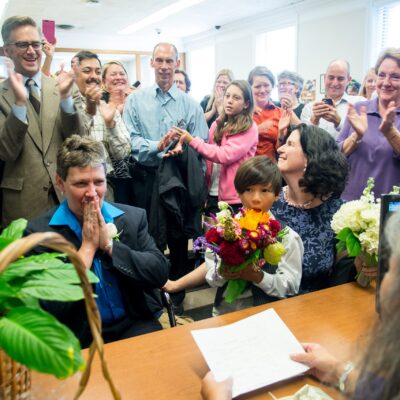In 2007, Charlottesville and Albemarle government officials identified sustainable development as a priority in their respective comprehensive plans. Last October, the Thomas Jefferson Planning District Commission (TJPDC) received nearly $1 million in federal grant money to start a “livability” plan and help both city and county achieve those goals.
Now, however, members of the Jefferson Area Tea Party (JATP) say “sustainable” is a term they can’t live with, and “livable” is a term they won’t sustain. Following a March Tea Party event where speakers conflated local sustainability initiatives with a socialist agenda backed by the United Nations, a few Albemarle supervisors want to put the brakes on the s-word.
|
In March, Jefferson Area Tea Party Chair Carole Thorpe organized an event focused on “The Deceptive Agenda of Sustainability in Local Government.” She told C-VILLE at the time, “We are disturbed that both the county and the city are dues-paying members of ICLEI.” |
On June 8, county supervisors will hold a work session to discuss the local impact of International Council for Local Environmental Initiatives—better known as ICLEI, a nonprofit organization that advises more than 600 American cities and counties on energy efficiency and carbon emissions. Albemarle, which adopted a Cool Counties resolution in 2007 to reduce emissions by 80 percent by 2050, pays $1,200 in annual membership fees. (Charlottesville pays $600.)
Local Tea Party members fear ICLEI membership may curtail individual liberties and private property rights through area comprehensive plans, due for updates in 2012. In February, JATP member Charles Battig told supervisors that “ICLEI-based groups have their eyes on revising the County Comprehensive Plan to codify their self-determined energy- and land-rationing quotas and levels of imposed sacrifice.”
But imposition has nothing to do with it, says ICLEI spokesman Guillermo Meneses.
“We do not mandate, impose, or enforce any national or international policies or initiatives,” says Meneses. “Local governments decide for themselves which programs they wish to participate in, and they define their own goals depending on local circumstances, interests, and abilities.” Meneses adds that, as of December 2009, Albemarle had reduced energy usage in county buildings by 16 percent, and saved $186,000 in energy bill costs since joining Cool Counties.
Both Albemarle and Charlottesville are required to update their comprehensive plans by 2012. In October, the Thomas Jefferson Planning District Commission received a $990,000 federal grant through the Department of Housing and Urban Development (HUD). The grant supports a TJPDC-led Livable Communities Planning Project, which will review how Charlottesville, Albemarle and UVA might merge separate sustainability goals and enforce them in their updated comprehensive plans.
In a May letter to county supervisors, JATP Chair Carole Thorpe wrote that the TJPDC “has incorporated highly coincidental language” from ICLEI’s emissions reduction documents. She also claimed that the Livable Communities project borrowed more ICLEI language, but suspiciously replaced the word “sustainable” with “livable.”
“Where did it come from and who put it there?” Thorpe asked.
Summer Frederick, the Livable Communities Planning Project Manager, says that the language was changed because many people “have a fixed idea of what sustainability means.”
“Using a different word creates a situation where we can have conversations up front about what [livability] means for this community specifically,” says Frederick.
In May, Supervisor Ken Boyd made an unsuccessful bid to end the county’s ICLEI membership, and called for the June work session.
“Based on what our citizens have brought to the forefront, I don’t know how we ever allowed the current association with ICLEI to come this far,” says Boyd. He adds that he is concerned that the county’s ICLEI membership began “without the full understanding, and possibly without the consent, of the [previous] Board of Supervisors.”
“The current board needs to evaluate what they are advocating, and if that meets the objectives of our community,” says Boyd.
Like Boyd, Supervisor Duane Snow attended a March Tea Party event called “The Deceptive Agenda of Sustainability in Local Government.” However, Snow did not second Boyd’s motion to withdraw from ICLEI. Snow tells C-VILLE that he is “still gathering information” and “trying to satisfy in my mind what ICLEI is all about.”
“Have I reached a conclusion? No,” says Snow. “I don’t know that I will until we have that discussion.”
Ultimately, Frederick says that JATP concerns over “livability” amount to a semantics argument. It’s not altogether different from suspicions about ICLEI, which added “Local Governments for Sustainability” to its name in 2003, or an editorial by Battig that criticized the move from “global warming” to “climate change.”
“I think the Tea Party has some serious concerns about us changing the terms,” says Frederick. “My understanding is that they think us changing the language may be us trying to cover up some perceived intent. In reality, it’s a word change that’s trying to insert an intent, not cover it up.” The definition, in other words, is the community’s responsibility.
/TeaParty.jpg)





